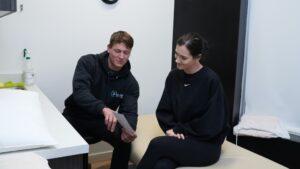Getting enough rest is crucial to your long-term health and overall wellbeing. However, if you experience frequent back pain, it can be hard to find a suitable position to fall asleep in.
Keep reading if you’re having trouble getting enough sleep because of back pain. This article lists some sleeping positions that can help you experience a comfortable, pain-free rest.
Sleeping Positions to Avoid Back Pain
Sleeping on Your Back
If you’re a long-time back sleeper who doesn’t like turning on their sides, these sleeping positions are for you.
- Sleeping on Your Back with a Pillow Under the Knees
Sleeping on your back helps evenly distribute your weight across your body and doesn’t strain your pressure points. It also ensures that your spine and internal organs are in alignment.
Laying flat on your back and placing a pillow under your knees will help keep your spine straight and neutral. It also helps maintain the curve of your lower back. Using a rolled-up towel for added support under the small of your back can also help relieve your pain.
- Sleeping on Your Back in a Reclined Position
Sleeping on your back in a reclined position, as you would do in a recliner, may not always be the best remedy for back pain. However, if you suffer from conditions like isthmic spondylolisthesis, then this sleeping position may work for you.
Reclining reduces the pressure on your spine and supports your back by creating an angle between your thighs and bottom.
Sleeping on Your Side
These sleeping positions are for side sleepers who find it uncomfortable to sleep on their backs.
- Sleeping on Your Side in the Fetal Position
To sleep in the fetal position, you first need to lay on your back and gently roll to one side. Then you bring your knees up to your chest and curl your torso inward.
If you suffer pain from a herniated disc, this sleeping position could bring you some relief. A herniation happens when a part of your disc pushes out of its usual space between the vertebrae in your spine. The fetal position can open the spaces between vertebrae and ease disc pain.
However, it’s vital to note that sleeping on one side for too long can cause body sores and increase your risk of shoulder pain. So remember to switch sides from time to time when sleeping in this position.
- Sleeping on Your Side with a Pillow Between the Knees
Sleeping on your side with a pillow between your knees can also help alleviate back pain. The pillow between your legs ensures that your neck, spine, pelvis, and hips are all in alignment.
If there is a gap between your waist and mattress while sleeping on the side, you can place a small pillow or a rolled-up towel there for added support.
There are several health benefits to sleeping on your left side. However, people with heartburn may find it uncomfortable to sleep this way.
If you’re pregnant, we recommend sleeping on your left side. It improves blood flow between the heart, kidneys, uterus, and fetus and keeps the pressure off your liver. Switch sides for a short if your body gets sore or you experience any discomfort.
It is also vital to consider any pre-existing health conditions or complications you have when deciding which side you should sleep on
Sleeping on Your Stomach
- Sleeping on Your Stomach with a Pillow Beneath Your Abdomen
Sleeping on your stomach is rarely recommended for back pain. It adds stress to your neck and aggravates lower back pain. However, placing a pillow beneath your lower abdomen and pelvis can help take some pressure off your back.
Some habitual stomach sleepers prefer not to use a pillow under their heads because they feel it aligns their spine better.
If you have a degenerative disc disease, sleeping on your stomach could benefit you. This position helps relieve the stress in the spaces between your discs.
The Importance of Alignment
None of these sleeping positions will help you if your spine is not properly aligned when sleeping. So, it’s essential to ensure that your ears, shoulders, and hips are properly aligned no matter which position you rest in.
Place pillows in the gaps between your body and the bed. These gaps strain your muscles and spine and can cause your back pain to spike. If you don’t have spare pillows, consider placing a rolled-up towel in the gaps.
It’s easy to lose your alignment when you turn around in bed. So remember to keep your core tight and your knees pulled toward your chest as you roll over. Take a second to realign your body before falling back asleep.
More Sleep Tips to Relieve Back Pain
Avoid Caffeinated Beverages
Excessive caffeine in your bloodstream can mess with your sleep cycles. So, if you cannot get through the day without your daily dose of caffeine, then you might have trouble sleeping. Try to cut back on caffeine by restricting your caffeine intake to a maximum of two cups of coffee a day.
And if you must drink caffeine, try to finish your last cup before midday.
Establish a Sleep Routine
Setting a sleeping schedule (and following it) can help your body adapt to a natural pattern of rest and activity. Getting eight hours of sleep every night can help ensure overall health.
Follow a Relaxing Sleep-Time Activity
If you find it hard to fall asleep during your bedtime hours, try doing a relaxing activity before you go to bed. You can read a book, take a warm bath, or listen to some calming music.
If they don’t work, try creating a sleeping routine that starts half an hour before your bedtime. Brush your teeth, turn down your bed, meditate, or do some mild exercises to help your body relax.
Don’t give up on your sleep routine, and try to stick to it as much as possible.
Gentle Stretches Before Bed
Mild stretching or yoga can help reduce your back pain and enhance your sleep quality. However, it’s vital to talk to your doctor about safe exercises for you to practice. You don’t want to strain your muscles too much and aggravate your pain.
If you experience chronic back pain that hinders you from living your best life, you might need to see a physical therapist. At Synergy Rehab, we provide personalized treatment plans and informative tools to help you better understand your condition. Our skilled team of therapists specializes in various rehabilitation treatments and is committed to providing quality healthcare services.
Synergy Rehab is available in several locations across British Columbia, including New Westminster, Burnaby, Richmond, and Surrey. If you have questions, call us at 604-503-1688 or contact us online. Click here to book an appointment.







